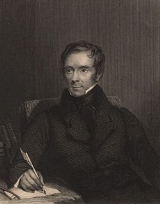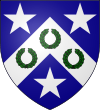
Benjamin Collins Brodie
Encyclopedia
Sir Benjamin Collins Brodie, 1st Baronet (9 June 1783 – 21 October 1862) was an English physiologist and surgeon
Surgery
Surgery is an ancient medical specialty that uses operative manual and instrumental techniques on a patient to investigate and/or treat a pathological condition such as disease or injury, or to help improve bodily function or appearance.An act of performing surgery may be called a surgical...
who pioneered research into bone and joint disease.

Winterslow
Winterslow is a village with a population of around 2,000 people, located about 6 miles North East of Salisbury, Wiltshire, United Kingdom, just off the A30 London Road. It has a primary school, a pre-school group, a village shop and post office, doctor's surgery, two pubs, 5 churches, a large...
, Wiltshire. He received his early education from his father; then choosing medicine as his profession he went to London in 1801 and attended the lectures of John Abernethy
John Abernethy (surgeon)
John Abernethy FRS was an English surgeon, grandson of the Reverend John Abernethy.He was born in Coleman Street in the City of London, where his father was a merchant. Educated at Wolverhampton Grammar School, he was apprenticed in 1779 to Sir Charles Blicke , a surgeon at St Bartholomew's...
and attended Charterhouse School
Charterhouse School
Charterhouse School, originally The Hospital of King James and Thomas Sutton in Charterhouse, or more simply Charterhouse or House, is an English collegiate independent boarding school situated at Godalming in Surrey.Founded by Thomas Sutton in London in 1611 on the site of the old Carthusian...
. Two years later he became a pupil of Sir Everard Home
Everard Home
Sir Everard Home, 1st Baronet FRS was a British physician.Home was born in Kingston-upon-Hull and educated at Westminster School. He gained a schoalrship to Trinity College, Cambridge, but decided instead to become a pupil of his brother-in-law, John Hunter, at St. George's Hospital...
at St George's Hospital
St George's Hospital
Founded in 1733, St George’s Hospital is one of the UK's largest teaching hospitals. It shares its main hospital site in Tooting, England with the St George's, University of London which trains NHS staff and carries out advanced medical research....
, and in 1808 was appointed assistant surgeon at that institution, on the staff of which he served for over thirty years. In 1810 he was elected a fellow of the Royal Society
Royal Society
The Royal Society of London for Improving Natural Knowledge, known simply as the Royal Society, is a learned society for science, and is possibly the oldest such society in existence. Founded in November 1660, it was granted a Royal Charter by King Charles II as the "Royal Society of London"...
, to which in the next four or five years he contributed several papers describing original investigations in physiology. In 1834, he was elected a foreign member of the Royal Swedish Academy of Sciences
Royal Swedish Academy of Sciences
The Royal Swedish Academy of Sciences or Kungliga Vetenskapsakademien is one of the Royal Academies of Sweden. The Academy is an independent, non-governmental scientific organization which acts to promote the sciences, primarily the natural sciences and mathematics.The Academy was founded on 2...
.
At this period he also rapidly obtained a large and lucrative practice and from time to time wrote on surgical questions, contributing numerous papers to the Medical and Chirurgical Society
Medical and Chirurgical Society of London
The Medical and Chirurgical Society of London was a learned society of physicians and surgeons which was founded in 1805 by 26 personalities in these fields who had left the Medical Society of London because of disagreement with the autocratic style of its president, James Sims...
and to the medical journals. His most important work is widely acknowledged to be the 1818 treatise Pathological and Surgical Observations on the Diseases of the Joints, in which he attempts to trace the beginnings of disease in the different tissues that form a joint and to give an exact value to the symptom of pain as evidence of organic disease. This volume led to the adoption by surgeons of more conservative measures in the treatment of diseases of the joints, with consequent reduction in the number of amputation
Amputation
Amputation is the removal of a body extremity by trauma, prolonged constriction, or surgery. As a surgical measure, it is used to control pain or a disease process in the affected limb, such as malignancy or gangrene. In some cases, it is carried out on individuals as a preventative surgery for...
s and the saving of many limbs and lives. He also wrote on diseases of the urinary organs and on local nervous affections of a surgical character.
In 1854 he published anonymously a volume of Psychological Inquiries—eight years later, the expanded, revised and updated 1862 volume appeared under his name. He received many honours during his career and attended to the health of the Royal Family, starting with George IV
George IV of the United Kingdom
George IV was the King of the United Kingdom of Great Britain and Ireland and also of Hanover from the death of his father, George III, on 29 January 1820 until his own death ten years later...
. He was also sergeant-surgeon to William IV
William IV of the United Kingdom
William IV was King of the United Kingdom of Great Britain and Ireland and of Hanover from 26 June 1830 until his death...
and Queen Victoria
Victoria of the United Kingdom
Victoria was the monarch of the United Kingdom of Great Britain and Ireland from 20 June 1837 until her death. From 1 May 1876, she used the additional title of Empress of India....
and was made a baronet
Baronet
A baronet or the rare female equivalent, a baronetess , is the holder of a hereditary baronetcy awarded by the British Crown...
in 1834. He became a corresponding member of the French Institute in 1844, DCL
Doctor of Civil Law
Doctor of Civil Law is a degree offered by some universities, such as the University of Oxford, instead of the more common Doctor of Laws degrees....
of Oxford in 1855, president of the Royal Society
Royal Society
The Royal Society of London for Improving Natural Knowledge, known simply as the Royal Society, is a learned society for science, and is possibly the oldest such society in existence. Founded in November 1660, it was granted a Royal Charter by King Charles II as the "Royal Society of London"...
in 1858 and subsequently, the first president of the General Medical Council
General Medical Council
The General Medical Council registers and regulates doctors practising in the United Kingdom. It has the power to revoke or restrict a doctor's registration if it deems them unfit to practise...
.
In 1858 Henry Gray
Henry Gray
Henry Gray was an English anatomist and surgeon most notable for publishing the book Gray's Anatomy. He was elected a Fellow of the Royal Society at the age of 25.-Biography:...
dedicated his book Gray's Anatomy
Gray's Anatomy
Gray's Anatomy is an English-language human anatomy textbook originally written by Henry Gray. The book is widely regarded as an extremely influential work on the subject, and has continued to be revised and republished from its initial publication in 1858 to the present day...
to Sir Benjamin Collins Brodie.
Sir Benjamin Collins Brodie died of a shoulder tumour in Broome Park, Surrey
Surrey
Surrey is a county in the South East of England and is one of the Home Counties. The county borders Greater London, Kent, East Sussex, West Sussex, Hampshire and Berkshire. The historic county town is Guildford. Surrey County Council sits at Kingston upon Thames, although this has been part of...
at the age of 79. His collected works, with autobiography, were published in 1865 under the editorship of Charles Hawkins.
In 1816 Brodie had married Anne Sellon, daughter of an eminent lawyer and they had several children of whom three survived into maturity. His eldest son, Sir Benjamin Collins Brodie, 2nd Baronet
Sir Benjamin Collins Brodie, 2nd Baronet
Sir Benjamin Collins Brodie, 2nd Baronet FRS was an English chemist.Brodie was the son of Sir Benjamin Collins Brodie, 1st Baronet, and his wife Anne , and was educated at Harrow and Balliol College, Oxford...
, was appointed Professor of Chemistry at Oxford in 1865, and is chiefly known for his investigations on the allotropic states of carbon
Carbon
Carbon is the chemical element with symbol C and atomic number 6. As a member of group 14 on the periodic table, it is nonmetallic and tetravalent—making four electrons available to form covalent chemical bonds...
and for his discovery of graphitic acid.

